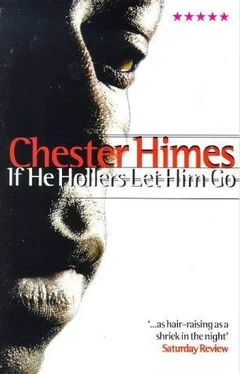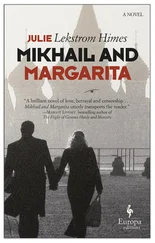Chester Himes - If he hollers let him go
Здесь есть возможность читать онлайн «Chester Himes - If he hollers let him go» весь текст электронной книги совершенно бесплатно (целиком полную версию без сокращений). В некоторых случаях можно слушать аудио, скачать через торрент в формате fb2 и присутствует краткое содержание. Жанр: Криминальный детектив, на английском языке. Описание произведения, (предисловие) а так же отзывы посетителей доступны на портале библиотеки ЛибКат.
- Название:If he hollers let him go
- Автор:
- Жанр:
- Год:неизвестен
- ISBN:нет данных
- Рейтинг книги:4 / 5. Голосов: 1
-
Избранное:Добавить в избранное
- Отзывы:
-
Ваша оценка:
- 80
- 1
- 2
- 3
- 4
- 5
If he hollers let him go: краткое содержание, описание и аннотация
Предлагаем к чтению аннотацию, описание, краткое содержание или предисловие (зависит от того, что написал сам автор книги «If he hollers let him go»). Если вы не нашли необходимую информацию о книге — напишите в комментариях, мы постараемся отыскать её.
If he hollers let him go — читать онлайн бесплатно полную книгу (весь текст) целиком
Ниже представлен текст книги, разбитый по страницам. Система сохранения места последней прочитанной страницы, позволяет с удобством читать онлайн бесплатно книгу «If he hollers let him go», без необходимости каждый раз заново искать на чём Вы остановились. Поставьте закладку, и сможете в любой момент перейти на страницу, на которой закончили чтение.
Интервал:
Закладка:
From the viewpoint of my hangover it didn't seem a hard thing to do. You simply had to accept being black as a condition over which you had no control, then go on from there. Glorify your black heritage, revere your black heroes, laud your black leaders, cheat your black brothers, worship your white fathers (be sure and do that), segregate yourself; then make yourself believe that you had made great progress, that you would continue to make great progress, that in time the white folks would appreciate all of this and pat you on the head and say, 'You been a good nigger for a long time. Now we're going to let you in.' Of course you'd have to believe that the white folks were generous, unselfish, and loved you so much they wanted to share their world with you, but if you could believe all the rest, you could believe that too. And it didn't seem like a hard thing for a nigger to believe, because he didn't have any other choice.
But my mind kept rebelling against it. Being black, it was a thing I ought to know, but I'd learned it differently. I'd learned the same jive that the white folks had learned. All that stuff about liberty and justice and equality… All men are created equal… Any person born in the United States is a citizen… Learned it out the same books, in the same schools. Learned the song too: '… o'er the land of the free and the home of the brave…' I thought Patrick Henry was a hero when he jumped up and said, 'Give me liberty or give me death,' just like the white kids who read about it. I was a Charles Lindbergh fan when I was a little boy, and thought George Washington was the father of my country-as long as I thought I had a country.
I agreed with the Hearst papers when they lauded the peoples of the conquered European countries for continuing their underground fight against 'Nazi oppression'; I always bought the Los Angeles Sunday Times too, and the Daily News; read the Saturday Evening Post and Reader's Digest sometimes out at Alice's house while I was waiting for her to dress; I even got taken in by Pegler plenty times. Like the guys said out at the yard, 'Ah believe it.'
That was the hell of it: the white folks had drummed more into me than they'd been able to scare out.
I knew the average overpatriotic American would have said a leaderman was justified in cursing out a white woman worker for refusing to do a job of work in a war industry in time of war-so long as the leaderman was white. Might have even called her a traitor and wanted her tried for sabotage.
It was just that they didn't think I ought to have these feelings. They kept thinking about me in connection with Africa. But I wasn't born in Africa. I didn't know anyone who was. I learned in history that my ancestors were slaves brought over from Africa. But I'd forgotten that, just like the aristocratic blue bloods of America have forgotten what they learned in history-that most of their ancestors were the riffraff of Europe-thieves, jailbirds, beggars, and outcasts.
So even though the solid logic of my hangover told me that Alice's way was my only out, I didn't have anything for it but the same contempt a white person has for a collaborator's out in France. I just couldn't help it. That much of the white folks' teaching was still inside of me.
I knew I could marry Alice-the chick loved me. Could marry her, go back to college and get a degree in law, go on to become a big and important Negro. I knew that most people would consider me a lucky black boy.
I knew I would be lucky too. Lying there with the hangover beating in my head like John Henry driving steel, I could see it from every angle-I couldn't keep from seeing it. I didn't have the strength to keep it from my mind.
In the first place my old man had been a steel-mill worker at National Malleable in Cleveland, Ohio, when I was born, and my mother had died when I was three. I had two brothers older than I, and we'd been poor boys. My old man had married again and had three other children by our stepmother and I lived in a cole attic room for twelve long years. Shep, my oldest brother, went East when he finished Central High and the last I heard of him he was in the rackets in Washington, D.C. Dick wanted to be an artist and fooled around with the group at Karamu; he's still in Cleveland, some sort of politician. I was the ambitious one, I'd wanted to be a doctor. I'd gotten my two years at Ohio State by washing dishes in the white fraternity houses about the campus. But when my old man took sick in '38 I had to stay home and dig in with the rest; and I never got back. I puttered about with pottery at Karamu and worked with the theatre group for a time-met some fine chicks, too, but none like Alice.
All I had when I came to the Coast was my height and weight and the fact I believed that being born in America gave everybody a certain importance. I'd never had two suits of clothes at one time in my life until I got in this war boom.
In the three years in L.A. I'd worked up to a good job in a shipyard, bought a new Buick car, and cornered off the finest coloured chick west of Chicago-to my way of thinking. All I had to do was marry her and my future was in the bag. If a black boy couldn't be satisfied with that he couldn't be satisfied with anything.
But what I knew about myself was that my desire for such a life was conditional. It only caught up with me on the crest of being black-when I could accept being black, when I could see no other out, such a life looked great.
But I knew I'd wake up someday and say to hell with it, I didn't want to be the biggest Negro who ever lived, neither Toussaint L'Ouverture nor Walter White. Because deep inside of me, where the white folks couldn't see, it didn't mean a thing. If you couldn't swing down Hollywood Boulevard and know that you belonged; if you couldn't make a polite pass at Lana Turner at Ciro's without having the gendarmes beat the black off you for getting out of your place; if you couldn't eat a thirtydollar dinner at an hotel without choking on the insults, being a great big 'Mister' nigger didn't mean a thing.
Anyone who wanted to could be nigger-rich, nigger-important, have their Jim Crow religion, and go to nigger heaven.
I'd settle for a leaderman job at Atlas Shipyard-if I could be a man, defined by Webster as a male human being. That's all I'd ever wanted-just to be accepted as a man-without ambition, without distinction, either of race, creed, or colour; just a simple Joe walking down an American street, going my simple way, without any other identifying characteristics but weight, height, and gender.
I liked my job as leaderman more than I had ever admitted to myself before. More than any other job I could think of; more than being the first Negro congressman from California. But it was just the same as all the rest: if I couldn't have everything that went along with it, if I couldn't be in authority over white men and women just the same as any other leaderman, to hell with it too.
I knew that that was at the bottom of it all. If I couldn't live in America as an equal in the minds, hearts, and souls of all white people, if I couldn't know that I had a chance to do anything any other American could, to go as high as an American citizenship would carry anybody, there'd never be anything in this country for me anyway.
And I knew I was a fool. That was the hell of it. All it did was give me a grinding headache to go along with the rest of my hangover, and a blinding sense of confusion. I didn't know whether I was going or coming. If it hadn't been for my riders I wouldn't even have made the effort to get out of bed. I took a couple of anacins and some coffee and that helped some.
When I went outside some of the confusion left me. It was a clear morning; the sun was coming up and the air smelled good. It was one of those mornings that ought to have made me feel good to be alive. But as soon as I got behind the wheel I began remembering all the crazy things I had done the night before. Fighting with Madge until I'd already gotten her down, then jumping up running at the sound of the word 'rape,' letting her go untouched. I'd set out to grind her down but in the end I was the one who was defeated. Maybe I would have been anyway. Maybe there just wasn't any way of winning. Like the man said, 'I can't win for losing.'
Читать дальшеИнтервал:
Закладка:
Похожие книги на «If he hollers let him go»
Представляем Вашему вниманию похожие книги на «If he hollers let him go» списком для выбора. Мы отобрали схожую по названию и смыслу литературу в надежде предоставить читателям больше вариантов отыскать новые, интересные, ещё непрочитанные произведения.
Обсуждение, отзывы о книге «If he hollers let him go» и просто собственные мнения читателей. Оставьте ваши комментарии, напишите, что Вы думаете о произведении, его смысле или главных героях. Укажите что конкретно понравилось, а что нет, и почему Вы так считаете.












